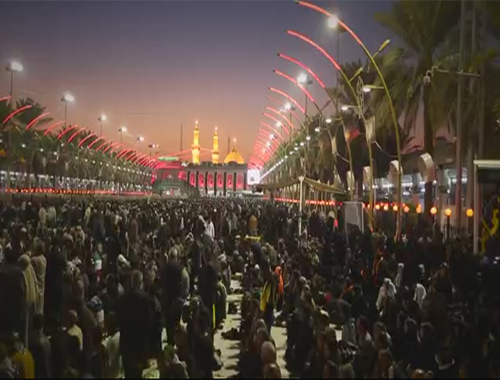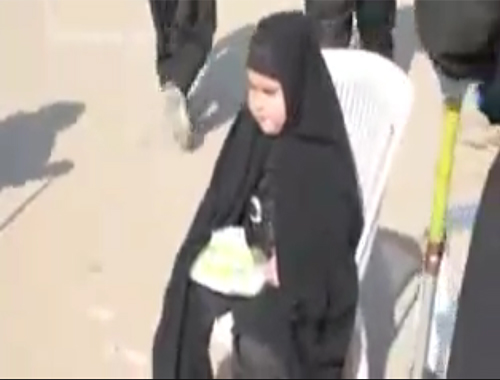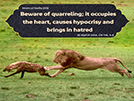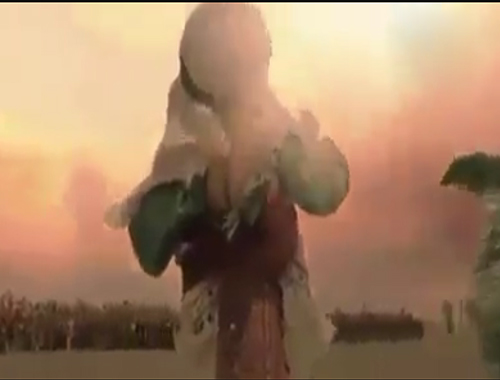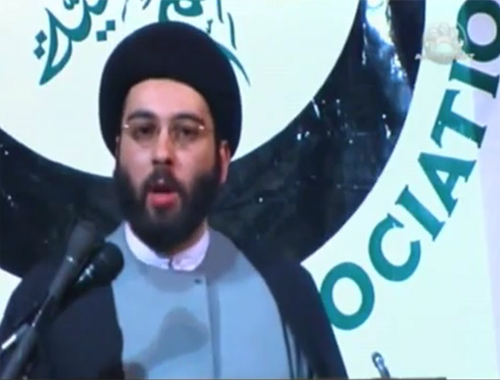Verse49
- Details
- Hits: 2960
(49) وَإِذْ نَجَّيْنَاكُم مِّنْ آلِ فِرْعَوْنَ يَسُومُونَكُمْ سُوَءَ الْعَذَابِ يُذَبِّحُونَ أَبْنَاءكُمْ وَيَسْتَحْيُونَ نِسَاءكُمْ وَفِي ذَلِكُم بَلاء مِّن رَّبِّكُمْ عَظِيمٌ
49. " And (remember) when We delivered you from the people of Pharaoh who had afflicted you with evil torment, slaughtering your sons and sparing your women-folk, and in that was a great trial from your Lord."
Commentary :
In this verse, the Qur'an points to another great bounty out of the bounties He bestowed on the Children of Israel. This favour is the bounty of deliverance from the grips of those transgressors. This is the greatest bounty amongst the bounties of Allah on them and He reminds them, saying:
" And (remember) when We delivered you from the people of Pharaoh..."
" ...who had afflicted you with evil torment, ..."
" ...slaughtering your sons and sparing your women-folk, ..."
They let your women-folk live as maid-servants and serve hard for them.
"...and in that was a great trial from your Lord."
To illustrate the torments of Pharaoh upon the Israelites, the Qur'an has particularly applied the term /yasumuna/ in the future tense of the verb, which, in Arabic, indicates the duration and continuity of that evil torment. Thus, they saw for themselves that their innocent sons were slaughtered before their eyes and their daughters were taken away from them to serve in the Egyptians' houses as maid-servants. That conduct caused them to tolerate and experience torture permanently, too. They were considered as servants, workers, and slaves of the Coptic people in Egypt and of the men of Pharaoh.
It is a matter of importance that the Qur'an counts this event as a great and grievous trial for the Children of Israel and, of course, bearing all those bitter harsh afflictions had been a hard tremendous trial.
It is also probable that the term /bala'/ ' trial ', here, has been used with the meaning of ' punishment '. The reason is that before that event, Israelites had been enjoying an abundancy of bounties with great power and authority. But they became ungrateful and the Lord punished them.
Anyhow, the day when the Children of Israel were delivered from the tyrannical clutches of the Egyptian monarch, the Pharaoh, was a very important historical day in their lives on which the Holy Qur'an has emphasized repeatedly.
Slavery of Females, Past and Present
In the history of the Israelites, their bondage in Egypt was indeed a tremendous trial for them. Even the Egyptians' wish to spare the lives of the Israelites' females when the males were slaughtered, as the Qur'an declares, added to their bitterness. So, their rescue from that cruelty was really counted as a bounty. It seems that the Qur'an intends to warn all human beings that they should try to obtain their rightful freedom however hard it may be, and protect it.
Hadrat Ali (a.s.) has pointed out this matter in one of his sermons: "...Real death is in the eife of subjugation while real life is in dying in the way of freedom..." (1)
But the modern world is different from that of the ancient in this manner. At that time, for example, Pharaoh, through his peculiar cruelty, slaughtered the men and the sons of the people who were his enemies and let their females remain alive to serve Egyptians. While, today, in this modern world, the spirit of manhood among males is often slaughtered under some other circumstances, and their females are mostly made slaves for the lustful pleasure of a group of filthy men. Sometimes, the Pharaohs of the Age have pity upon neither men nor women; neither sons nor daughters; neither adults nor infants. They have verified this statement in the massacres they have committed in some Islamic and non-Islamic countries by using chemical bombs and the likes of them. Their actions are often even worst than what the Pharaohs of Egypt used to do.
Now, why did Pharaoh decide to kill the Israeli boys and let their women-folk live ? Some of the commentators believe that the reason for that murderous decision was the dream that Pharaoh dreamed. A more appropriate answer to this question will be discussed when commenting on Sura Al-Qasas No. 28, verse 4. Therein, you will come to know that the reason for that murder was not only Pharaoh's dream, but he and his clique also stood in awe of the increasing number of the Children of Israel and that they might become powerful and destroy the government of Pharaoh. This factor helped them make that hostile decision.
Some details about the miserable lot of the Israelites under the bondage of Pharaoh and how they were rescued, are also explained in Exodus the opening chapter of the Bible i.e. Chapter 1.
(1) Nahjul-Balaqah, sermon 51


